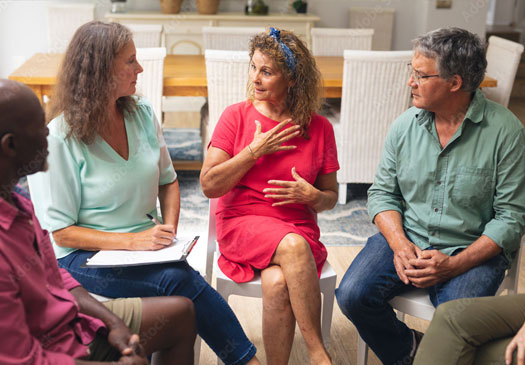Health Literacy is the ability to obtain, read, understand, and use healthcare information in order to make appropriate health decisions and follow instructions for treatment. We agree with the CDC argument that health literacy is connected to health equity and health equity is the attainment of the highest level of health for all people. LHEA is working with Bowie State University and the Department of Health from Prince George’s County in advancing the health literacy of Latinos living in the area regarding COVID-19 vaccination and care.

Despite the fact that this program is still in its early stages, our Community Workers are willing to support the different needs that may arise so that each Latino can learn about their best options in health services and how to access them.
Click on the buttons below if you need help.
Personal health literacy is the degree to which individuals have the ability to find, understand, and use information and services to inform health-related decisions and actions for themselves and others.
Organizational health literacy is the degree to which organizations equitably enable individuals to find, understand, and use information and services to inform health-related decisions and actions for themselves and others.
In 2022, Maryland Latinos Unidos became a community partner of Project LEAP and launched, Building Bridges to Health Equity in Prince George’s County: A Health Literacy Program. Project LEAP is run by the Prince George’s County Department of Health and the Maryland Center at Bowie State University. The goal of the “Building Bridges to Health Equity” in Prince George’s is to increase Latino health literacy and the utilization of social services benefiting Latinos 18 years old and up in Riverdale and Hyattsville to improve Latino health outcomes.
Our core strategy is to build connections (“bridges”) between the institutions that support Latinos 18 years and older through schools, churches, health system, sports facilities, community organizations.
Why did we choose to focus our health literacy work in Prince George’s County first?
MLU’s work on Latino health literacy and Covid-19 vaccine equity focuses on Prince George’s county, primarily in Riverdale and Hyattsville, Langley Park and to a lesser extent in Capitol Heights and Mt. Rainier. MLU has experienced firsthand the need for linguistically appropriate and culturally competent health literacy.
New community members
Most recently, Prince George’s has been impacted by the arrival of new migrants coming from Del Rio, TX primarily from Venezuela, Nicaragua, and Cuba. A total of 900 buses are expected to arrive between April 2022-May 2023. As of May 15 2022, some 922 immigrants passed through the area of which about 1/3 have remained behind.
These individuals add urgency to our vaccine equity coalition work in an area heavily impacted by Covid19. The growth trend promises to continue.
“We will achieve health equity when everyone has the opportunity to be as healthy as possible.” CDC

For Latinos, health literacy continue to be a serious challenge across the United States, but particularly in Maryland. Among the many lessons that we learned from Covid19 is that Latinos continuously receive inaccurate information about healthcare choices, especially about vaccinations. Much of this information comes from across social media sources where they get their news about everything from healthcare to voting.
These challenges were especially daunting during the first terrible days of the Covid19 pandemic. Through the MALVEC program, we learned that vaccine hesitancy was due to a multiplicity of factors. A history of medical exploitation and discrimination, language barriers, as well as concerns about immigration status, childcare, and work schedules impeded Latinos from access to care. All of these factors create a foundation of doubt and mistrust that allows misinformation about Covid-19 vaccines to flourish on social media.
Disinformation and misinformation harm the Latino community
A Washington Post op.ed. noted that 2/3rds of Latinos treat YouTube as a primary source for their news and information about healthcare and politics. And according to a December 2021 Nielsen report, half of Latinos in the United States use WhatsApp, the Facebook-owned messaging platform, “more than any other ethnic or racial group in the country.” These challenges are troubling.
Enter our blog and learn about stories, articles, infographics and videos about Mental Health in the Latino community in Maryland. You will also find a directory of institutions that can provide you with the support you need depending on the area in which you are.
Go to DirectoryThese are the institutions that help us coordinate aid to communities at risk. Click on each logo to be redirected to their own websites.